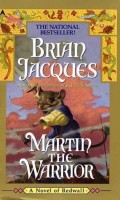February 9th, 2011 / 3:13 pm
Author News
Nick Antosca
Author News
REDWALL OBIT
 Brian Jacques, the Redwall guy, just died. I read those books when I was tiny… when there were only like four or five of them (now there are 21; a new one is soon to be published). His name brings back memories. I used to have nightmares about a huge rodent with a skull-helmet and a large, weighted net chasing me.
Brian Jacques, the Redwall guy, just died. I read those books when I was tiny… when there were only like four or five of them (now there are 21; a new one is soon to be published). His name brings back memories. I used to have nightmares about a huge rodent with a skull-helmet and a large, weighted net chasing me.
Tags: brian jacques, redwall

yeah i saw this and was sad. i loved those books.
yeah i saw this and was sad. i loved those books.
I think I read like ten of them. High caliber literature for kids to read. RIP.
yeah same here, i read those books
yeah same here, i read those books
Oh man, I loved these books so hard. They made me so hungry.
dang, just got my little brother started on these. they were a big deal for me and my cousin.
LOVE THOSE BOOKS UNTIL THEY GOT BORING AND REPETITIVE BUT I STILL HAVE ALL COPIES IN FIRST EDITION GRAY-WITH-RED-BINDING.
This is really bumming me out. When Bill Watterson goes my childhood will be officially dead.
Has the time come for HTML Giant to ditch the superfluous “like”? It’s become a substitute for style.
What’s the superfluous “like”?
the like in “there were only like four or five of them”. It’s all over HTML Giant. Etc.
Phmadore, above, has fallen under its spell: “I think I read like ten of them”. It’s a hipster tic. Imports a generation’s vagueness into any sentence. You know when you use it that you’re doing something pretty big. It’s doing a lot of work, that like. But it’s getting tired after all these years. It brings an attitude into a sentence that may be yesterday or last year’s attitude, rather than the true attitude of the moment.
“Like” often is spoken as a place-taking grunt, used to gather thoughts or sound out rhythm. As a linguistic nanny-statist, I, too, dislike this ‘uh, uh, it’s like, I mean, you know’ “like” – a “like” which neither announces ‘affection’ nor yokes a comparison.
But phmadore’s “like” on this thread is not
To the contrary, the theatrical [i]mports a generation’s vagueness is closer to this “like”‘s adverbial semantic content: it’s a synonym for ‘approximately; about; around’.
Like, why not like one of the like half dozen words like ‘approximately’?
yes, conceded, deadgod. in fact i started off by calling phmadore’s like superfluous but read the sentence again and saw it wasn’t. so i decided instead to claim that phmadore’s like, though not superfluous itself, was inspired by the superfluous like of Nick Antosca/likes of HTML Giant etc. I’d venture that phmadore could name exactly the number of redwall books he/she has read, if he/she thought about it… but better to give an approximate number, because that way you can invoke the superfluous like. it’s more stylish to be approximate, because being approximate means you can bring like, superfluous in spirit if not technically so, into the equation. but it’s been overused – isn’t it a DFWism? – and has lost its verve.
He is in Mossflower country now.
Well, that’s a subtle-but-fair point: one valence osmotically presses itself into another, despite the full semantic use of the second – especially as a function (or epiphenomenon?) of “style”. If one calls “style” voice, it seems less calculated, no?
I would add that I could not name the precise number of Tom Swift books I read, nor Nancy Drew nor Hardy Boys – nor, indeed, Ludlums (fewer than ten, that last). When they’re each so similar to the others, my memory of them is a smear. And neither is this incompetence a pretension, at least in my case.
Yeah, ‘like’ and approximate thought clearly originate with hipsters and HTMLGiant. DFW managed to go back in time and plant this in American speech decades ago, like God’s tricksy fossils.
Awww
Eulalia!